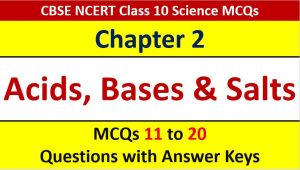If you are preparing for CBSE Class 12 Board Exam Term 1 which will be an objective type questions paper, then you need to practice multiple choice questions of Class 12 Chemistry Chapterwise. In this article of AKVTutorials, you will get General Principles and Processes of Isolation of Elements CBSE Class 12 Chemistry MCQ Questions with Answer Keys
General Principles and Processes of Isolation of Elements MCQ Question No 11:
The undesired material which is present with the element in its ore in known as _____.
Option A : Slag
Option B : Gangue
Option C : Flux
Option D : Sludge
Show/Hide Answer
Option B : Gangue
General Principles and Processes of Isolation of Elements MCQ Question No 12:
A reaction proceeds only when the value ΔG is ______. if ΔS is positive, on _____. The temperature T, The value of TΔS will increase and then G becomes negative .
Option A : Positive, Increasing
Option B : Negative, Increasing
Option C : Positive, Decreasing
Option D : Negative, Decreasing
Show/Hide Answer
Option B : Negative, Increasing
General Principles and Processes of Isolation of Elements MCQ Question No 13:
In the Ellingham diagram, if two metals are present, two equilibriums have to be considered, So that the metal with the more negative ΔG ____. and the other gets ____.
Option A : Reduces, Oxidized
Option B : Reduces, Ionized
Option C : Oxidizes, Reduced
Option D : Oxidizes, Ionized
Show/Hide Answer
Option A : Reduces, Oxidized
General Principles and Processes of Isolation of Elements MCQ Question No 14:
______ is not a factor for choosing a substance for reducing a particular ore.
Option A : The cost of the reducing agent
Option B : Energy cost
Option C : The desired purity of the metal
Option D : The percentage of the metal present
Show/Hide Answer
Option D : The percentage of the metal present
General Principles and Processes of Isolation of Elements MCQ Question No 15:
In extraction of Iron, Carbon Monoxide acts as _____.
Option A : Oxidizing agent
Option B : Reducing agent
Option C : Neutralizing agent
Option D : Precipitating agent
Show/Hide Answer
Option B : Reducing agent
General Principles and Processes of Isolation of Elements MCQ Question No 16:
Apart from the statement “____”, all other statements given below are correct
Option A : Aluminium foils are used as wrappers for chocolates
Option B : Copper is used for making water and steam pipes
Option C : Zinc is used for galvanizing iron
Option D : Coinage alloy is a mixture of nickel and iron
Show/Hide Answer
Option D : Coinage alloy is a mixture of nickel and iron
General Principles and Processes of Isolation of Elements MCQ Question No 17:
During the operation of electro chemical cells, _______ energy is transmitted into _____ energy
Option A : Chemical, mechanical
Option B : Chemical, electrical
Option C : Rotational, electrical
Option D : Electrical, chemical
Show/Hide Answer
Option B : Chemical, electrical
General Principles and Processes of Isolation of Elements MCQ Question No 18:
Siderite is ______ ore of Iron
Option A : Sulphide
Option B : Oxide
Option C : Carbonate
Option D : Chloride
Show/Hide Answer
Option C : Carbonate
General Principles and Processes of Isolation of Elements MCQ Question No 19:
Titanium is produced by titanium(IV) chloride using a more reactive metal such as ______ or ________.
Option A : Copper, Sodium
Option B : Sodium, Iron
Option C : Sodium, Magnesium
Option D : Sodium, Calcium
Show/Hide Answer
Option C : Sodium, Magnesium
General Principles and Processes of Isolation of Elements MCQ Question No 20:
Distillation is very useful for low boiling metals like ______
Option A : Zinc and Mercury
Option B : Sodium and Magnesium
Option C : Iron and Copper
Option D : Gold and Silver
Show/Hide Answer
Option A : Zinc and Mercury

